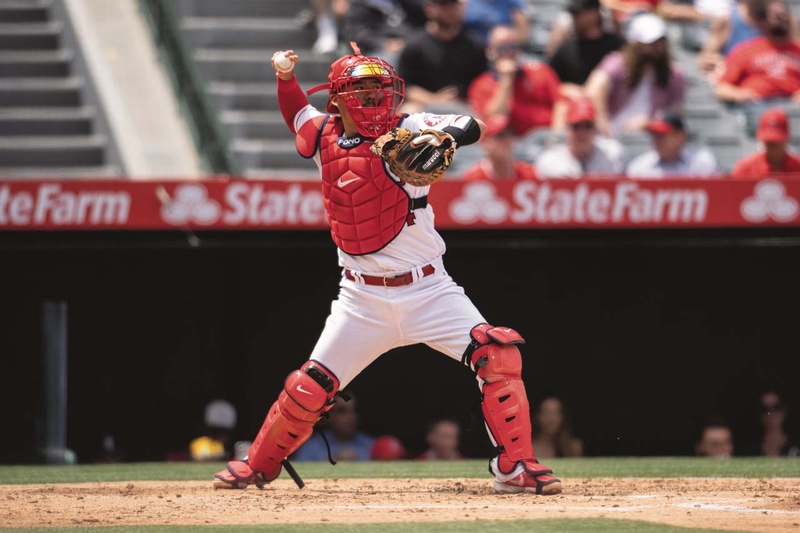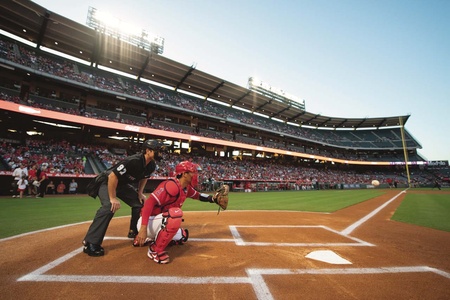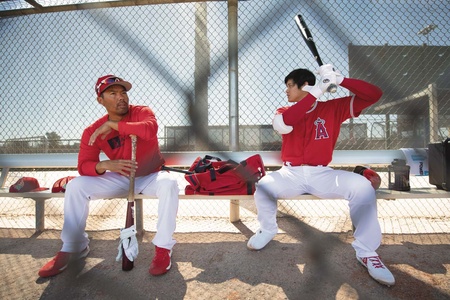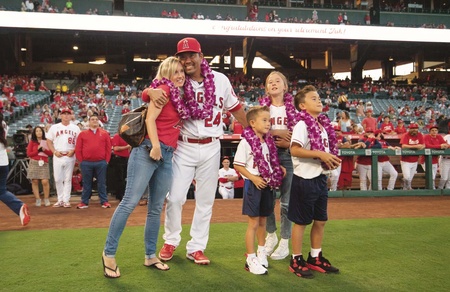When you enter Kurt Suzuki’s home in Redondo Beach, California, you are struck by what is missing as much as what is present. Unlike many other professional athletes who have experienced success, there are few reminders of the faded past.
The shelves and walls are not overflowing with trophies and banners proclaiming his 16-year career in Major League Baseball. Nor is there much to remind the visitor about Suzuki’s Cal State Fullerton glory days when his underdog team won the 2004 College World Series and he was lauded with the prestigious Johnny Bench and Brooks Wallace awards. Wandering through the hallways there is very little to mythologize his 2014 MLB All-Star nod or trumpet the World Series championship that the Maui native’s Washington Nationals captured in 2019.
Instead, it is a modest home filled with family pictures, kids’ drawings and the familiar watermarks of daily life where the father could be mistaken for your next-door-neighbor, your favorite uncle or your best friend’s dad who lives down the street.
Born on Oct. 4, 1983, Suzuki grew up in Wailuku, Maui, where he spent an idyliic childhood going to the beach, hanging out with his friends, and playing every sport.
“It was a different time back then,” said Suzuki. “I played soccer, basketball, flag football, baseball and surfed. Nobody focused on only one sport. Everyone I talk to now tells me that I had the best childhood growing up on Maui and they are right. There no travel teams or outside pressures and my parents never pushed me to do one thing. They let me do what I wanted to do athletically and that’s one reason why I’m where I’m at today. I’m not saying that the way it is now is wrong but back then you had time to be a kid.”
Suzuki was fortunate to have role models like his parents and close relatives, but also had high school coaches like Kahai Shishido and Jon Viela who emphasized being a good person and teammate above everything else.
“Their lessons still guide my life today: Do the right thing. Don’t be arrogant. Stay grounded and treat everybody the same,” reminisced Suzuki. “To coaches like Kahai and Jon, how you handled yourself off the fleld was just as important as how successful you were on the field.”
Ironically, Suzuki didn’t focus on baseball until his junior year in high school when he started thinking about college and his future beyond Maui. Inspired by his older sister who was a student at the University of Notre Dame, Suzuki began to wonder what he was capable of achieving.
“My dream was to play college sports but I knew I wasn’t fast enough for soccer and I was too small for basketball,” recalled Suzuki. “So I saw baseball as my best opportunity at a college scholarship. If you had good hand and eye coordination and could throw and catch, you had a chance. I’m not perfect but when I make up my mind to do something, I give 100 percent so baseball became my ticket to a bigger world.”
The leap from high school to college baseball was daunting, however, and many were advising Suzuki to go to junior college where he was guaranteed more playing time. Ultimately, his goal was to play at the Division 1 level, and so he accepted a scholarship offer form Cal State Fullerton, which eneded up being the perfect fit.
“It was a little smaller school so there was a real family feel to the team among the coaches and the players,” said Suzuki. “I was very fortunate to be there because the transition from high school to college baseball was difficult. On Maui everybody knows everybody and you are surrounded by your uncles, aunties, parents, and grandparents. California was huge and you are on your own playing with and competing against so many talented kids who talk diffferently, dress differently and act differently. Also, in high school, onece baseball season ended that was it until the next year. In college it was all baseball from September to June. That’s one reason why I suffered so many injuries during my first two years. My body had to adjust and I had to grow up quickly but that’s what I wanted.”
The hard work paid off as Suzuki would eventually be drafted out of college by the Oakland Athletics in 2005 and enjoy an exceptionally long career playing for the Athletics, the Atlanta Braves, the Los Angeles Angels, the Minnesota Twins, and the Washington Nationals.
“To play a game for a living and to use that success to support your family is a great blessing,” said Suzuki. “Most professional athletes have very short careers and the percentage of those who last more than a few years is very small. For whatever time I had in the MLB I knew I wanted to give everything I had. I didn’t want to regret anything. I didn’t want to look in the mirror later and think if i had only trained harder, learned more, or taken better care of my body I could have played longer. I was never the biggest, strongest or fastest played on the field, but I took tremendous pride in my professionalism. There were a lot of players who were more talented, but nobody was going to outwork me.”
As a catcher, Suzuki became know for his uncommon ability to handle pitchers and that became his entree into staying in the big leagues beyond the normal tenure of most players.
“The key to working with pitchers is establishing trust,” share Suzuki. “When you are a kid you trust your friends, relatives and parents because you know they will support you unconditionally. Pitchers need to feel that you will stand behind them no matter what happens. When things go bad, and they will go bad, pitchers need to know you are doing everything possible to help them succeed. They have to feel that you won’t jump ship and abandon them. Ultimately, it’s very much a family relationship because it’s all about caring, love and trust.”
Suzuki’s time in the major leagues is filled with the swirl of memories both good and bad but he would not trade a minute of his career for anything. He understands how fortunate he was to enjoy the life he was given and how lucky he was to meet so many great people.
“The highlight of my professional career was winning the World Series. It’s a level of excitement and emotion that is indescribable,” said Suzuki.
“The year really begins with the off season and for the next seven months every team’s goal is to win in all. So there is something extraordinary about winning the final game of the entire MLB season. I knew it was going to be my last chance to win a championship: To be able to run onto the field, hold the trophy, mount the stage, and celebrate with my teammates in the clubhouse. Those memories will never leave me and I think about them every day.”
While many see the glamour of the MLB lifestyle, Suzuki believes that most people don’t understand what it means to be a professional athlete at the highest level. The pressure and the expectations only increase as the rewards become greater.
“In the MLB. you have to prove yourself every day and you are constantly being challenged by your coaches, your teammates and your opponents,” said Suzuki.
“At the start of my career people said I wasn’t talented enough and at the end they said I was too old. So I took all of that as inspiration to prove people wrong about what I could accomplish. That’s what really drove me. It wasn’t just the competition on the field; it was the opportunity to prove people wrong about what they thought I could do. But it’s also much more than that. To stay in professional baseball for a long time, you have to be a good person and treat people right. You see players run themselves out of the game because they don’t understand this. It’s hard because being a professional athlete is so different. Everyone caters to you and is constantly telling you how great you are. After awhile you can start believing them and that’s when you lose your way. That’s why it’s so important to have a strong support system behind you. Otherwise, it’s very hard to survive.”
For Suzuki his support system is his wife and children and so it is not surprising that his greatest hardship as a ball player was not on the field but being separated from his family. “We play 162 games a year and we are constantly traveling. To stay in the game for any decent length of tme, you are also moving from franchise to franchise, which means you are uprooting your family from city to city,” said Suzuki.
“Your wife raises the kids and if you don’t have a partner who understands what it means to be a professional athlete and can keep everything together, it won’t work. I missed soccer games, school events, holidays, birthdays and anniversaries because I was with the team. Only now when I am retired do I understand how tough it was on my wife to raise the kids on her own.”
Eventually, Suzuki realized that the next chapter of his life was beckoning and he retired from the game in 2022. “When you play in the MLB you perform in state of the art stadiums, stay in the best hotels, travel on chartered flights, and you rarely have to wait in line for anything. But after awhile I reached a point where I felt there was nothiong left for me to prove,” said Suzuki.
“My children are now twelve, nine, and six and I want to be with my family now. I just want to be a father and raise my kids and be a husband to my wife.”
Today, Suzuki is a baseball and soccer coach to his kids and a special assistant to Perry Minasian, the general manager of the Los Angeles Angels. While he helps with the team’s pitchers and catchers, his time is much more centered on his children’s lives at school and on the playing fields.
“It’s the little things that make me happy now: Taking my daughter surfing. Attending father and daughter dances. Driving my son to practices,” concludes Suzuki. “I’m just taking it day by day, enjoying my family and watching my kids grow up.”
*This article was originally published in The Hawai‘i Herald on June 2, 2023.
© 2023 Alan Suemori






